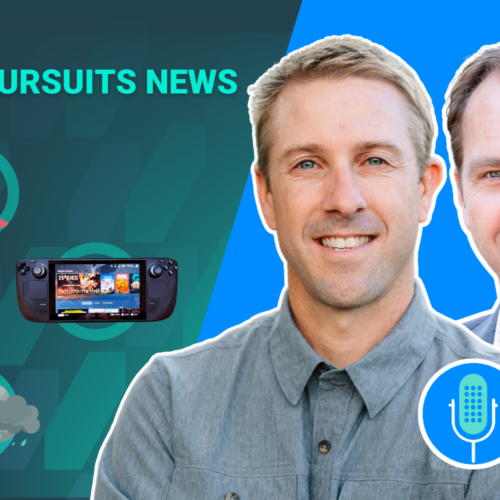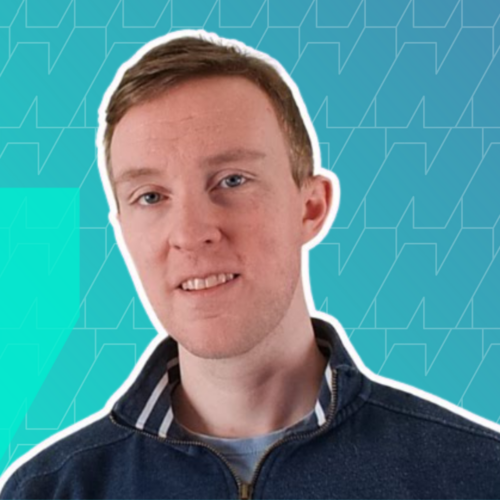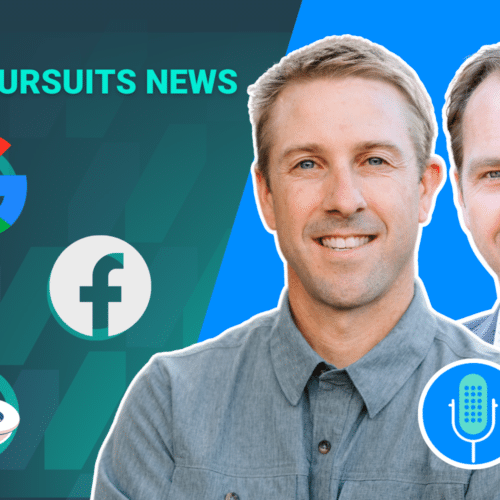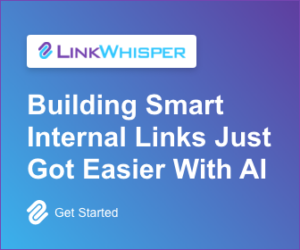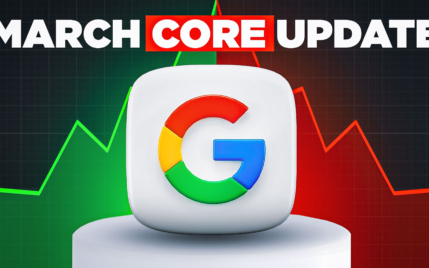Podcast 156: How Miles Beckler Went From Affiliate Products On MySpace To 100,000+ Subscribers On Youtube
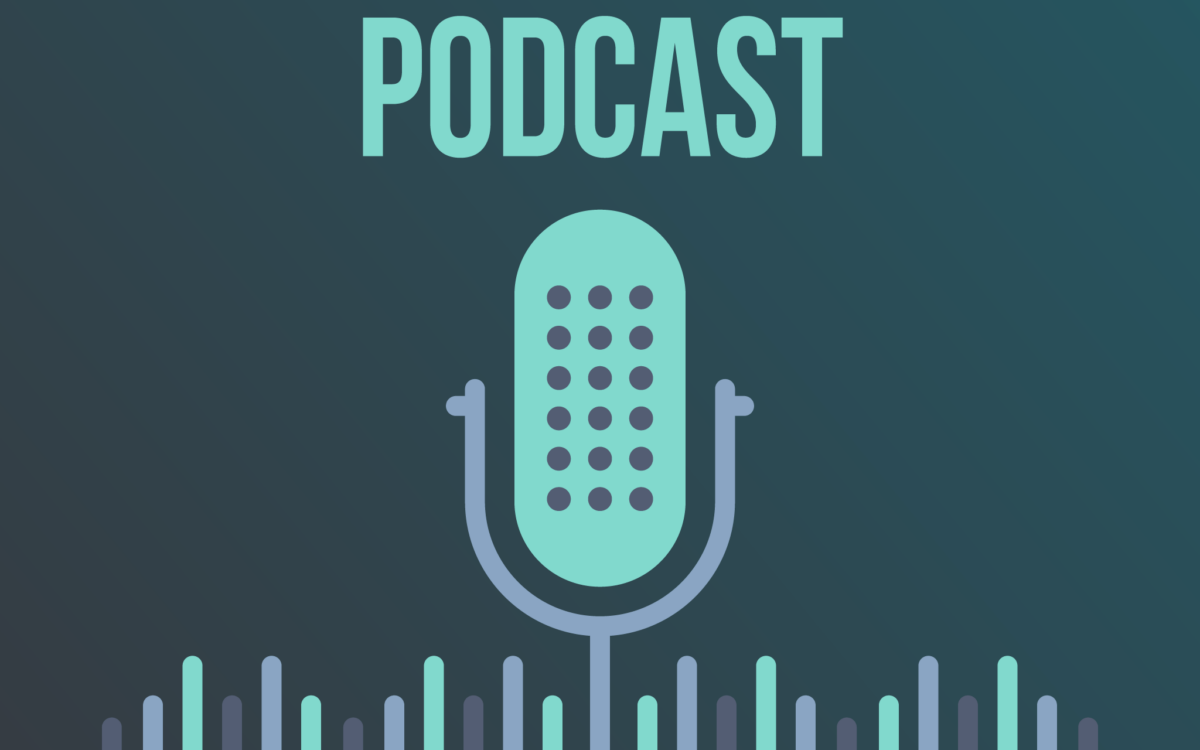
When you buy something through one of the links on our site, we may earn an affiliate commission.
In today’s episode, I’m excited to introduce you to Miles Beckler from MilesBeckler.com. Miles has been helping his wife operate and grow their site, Ask-Angels.com, for many years.
Even though we don’t spend much time chatting about this specific site, it’s one that has gotten over 33 million visitors and is a very significant business, so Miles knows what he’s talking about.
After the success of Ask-Angels—it continues to be successful—Miles decided to start a YouTube channel to share his advice on keyword research, SEO, Facebook ads, and much more for free, so that others could become successful entrepreneurs.
If you are looking to get some motivation in your business, I hope you’ll stick around and listen to Miles. He has great advice to share and he’s highly motivating as well. If you want to follow along with Miles, you can find him on YouTube or go to MilesBeckler.com.
Mentioned On The Podcast
- MilesBeckler.com
- Ask-Angels.com
- Miles Beckler's Youtube channel
- Miles Beckler's affiliate marketing case study
- OwnTheYard.com
- Long Tail Pro
- Quora
To get in touch with Miles, you can check out his Youtube channel, visit his website, or search him on Facebook at Miles Beckler.
Thanks for listening!
Full Transcript
Spencer: Hey, everyone. Welcome back to another episode of the Niche Pursuits Podcast. I’m your host, . Before we jump into today’s episode, I wanted to tell you a little bit about Ezoic. Ezoic is an ad platform that I have been using on my Niche Site Project 4 site and I’ve been very happy with it.
Ezoic is a Google award-winning technology that everyone from niche website owners to major brands use to grow and monetize their websites. Ezoic is also a Google-certified publishing partner. The platform leverages artificial intelligence to learn from website visitors with the goal of providing more personalized experiences that will improve on page experiences, which is session length, while also optimizing revenue and monetization on a per visitor basis.
The Ezoic platform features everything from intelligent website analytics to advanced automated visitor segmentation tools that allow publishers to improve visitor experiences and increase overall website revenue. Overall, there really are some big benefits to using Ezoic. It’s more than just an ad platform, but it truly is a platform that allows publishers to implement sophisticated ad operations and monetization practices on their website using advanced artificial intelligence. This allows publishers to manage as much or as little as they want. You simply drag and drop ad placeholders, and Ezoic will help automatically test thousands of ad partners, ad locations, ad types, and control ad density. This means Ezoic optimizes revenue and engagement for each unique visitor, maximizing the revenue publishers earn. If you want to go and check out Ezoic, you can go to nichepursuits.com/ezoic.
In today’s episode, I’m excited to introduce you to Miles Beckler from milesbeckler.com. Miles and I connected a couple of months ago and I was surprised to hear how much we have in common. Not only have we both been building online businesses for a decade, but we also both believe strongly that entrepreneurship can solve a lot of today’s problems.
Miles has been helping his wife operate and grow their site, ask-angels.com, for many years. Even though we don’t spend much time chatting about this specific site, it’s one that has gotten over 33 million visitors and is a very significant business, so Miles knows what he’s talking about.
After the success of Ask-Angels—it continues to be successful—Miles decided to start a YouTube channel to share his advice on keyword research, SEO, Facebook ads, and much more for free, so that others could become successful entrepreneurs.
After doing 90 videos in just 90 days, he started to see that he could build a great following and business on YouTube. Now, his channel has over 100,000 subscribers and is the main engine behind his personal brand. We dive into lots of YouTube tips and what his mindset is there.
You’ll also find it interesting that Miles has just now starting an experiment, a public case study to build an affiliate website that makes $3000 a month in just 12 months. He plans to spend $50,000 to build the site and outsource everything. We have a great discussion about the pros and cons of doing public case studies as I share what I’ve learned in doing four niche site projects.
In addition, we chat about his email list, which he also believes is core to his business and I agree. Is sending daily emails too much? We dive into why he sends daily emails and much more.
If you are looking to get some motivation in your business, I hope you’ll stick around and listen to Miles. He has great advice to share and he’s highly motivating as well. If you want to follow along with Miles, you can find him on YouTube or go to milesbeckler.com.
Hey, Miles. Welcome to the Niche Pursuits Podcast.
Miles: Hey, Spencer. Thanks for having me on.
Spencer: It is great to have you. We connected a little while ago privately. I got a jump into your business what’s working well for you. You got a really interesting business, so I’m excited to introduce you to my audience, to the Niche Pursuits audience. This should be great. You got a lot of tips to share. Before we dive into your business right now, what was your first online business? What were you doing before milesbeckler.com?
Miles: For my first one, we had to go back to 2003 when MySpace was the big social media network. I was working at the college radio station at a community college in California. My program director, another student, wanted me to help more with the station, but I always had to go to work. He showed me this little side hustle that was essentially direct-linking MySpace users to affiliate products. It’s kind of like CPA. It’s the wrong way to build a business—100% transparency—and it worked.
I started making a couple of grand a month. I think it got upwards of $3000–$4000 a month. It worked for about a year-and-a-half until they sold the platform and they literally closed the loophole. They shut down my link, so then it just completely went to zero. Out of that, I learned that it’s possible. You can actually get income and that’s a big belief shift for people. That might have actually been the most important step in the whole process.
But then, I really learned what I did wrong. I didn’t grow a list, I didn’t build an audience, I didn’t really add any value to the marketplace. From there, it took several years of trying different entrepreneurial endeavors before my wife and I collaborated on a website in the meditation and spirituality space and angels in 2009. We went all-in this time. It was all-in on valuable content to help others with a huge focus on growing an opt-in email list that we could run.
Since then, we’ve done all kinds of monetization from selling services to creating digital products to selling things as affiliates. That website is now about 10 years old. Amazing amount of traffic, something like 33 million visitors over the history of that site.
Then in 2016, I started teaching what we did to grow that business as well for free on YouTube, kind of paying it forward. There really wasn’t anybody there teaching me as we learned that. I had to learn it the hard way. So, I wanted to give back to the community and make sure the basics of how to build a funnel, how to do SEO, how to do keyword research are all out there on YouTube for free. Now, we have a couple of different businesses going that we keep going at an aggressive pace.
Spencer: Very cool. Your business right now then is the ask-angels.com and milesbeckler.com that has the YouTube channel, the email list, everything else associated with it. Those are the two main businesses, right?
Miles: Correct.
Spencer: Anything else that’s going on or everything’s focused right there?
Miles: At this point, they’re both personal brands. You probably understand. You built software, you’ve got a personal brand thing going on. A personal brand is not for everyone and a large segment of my audience has continued to ask like, “Miles, I’m not an expert in something. You brought this level of expertise of digital marketing to the world. Your wife has her level of expertise in what she does. How do I start from zero?”
This past month, actually—I just completed month one—I am starting a brand new affiliate case study website, where we’re taking a haphazardly chosen niche and we’re just going to build a successful cash flow off of it.
For me, in my business at this point, it’s an investment. I’m essentially taking income from one business brand and I’m deploying it to go build another asset, but at the same time, I’m tracking it as a case study because I really believe in my heart of hearts anyone can grow a successful business online as long as they’re willing to do the work and put in the time.
It actually takes a lot of time and it takes a lot of energy. I’m outsourcing a lot of that. I got a project manager. I got a team or writers who are going to be doing most of the work. I’m funding it and documenting the process.
With that said, anyone can just do the work themselves on nights and weekends, which is how we started with my wife’s website, which is how I started my YouTube channel and now is 100,000 subscribers. There is the bootstrap approach to it, but I guess at this point, I am starting a third brand that is designed to show that I have a little more than affinity in this world.
I know what these things are and I know enough to be dangerous. I’m not an expert in this. I’m not an authority in this by any means. I’m convinced I’m going to grow a $3000 a month business in about a year’s time is my goal. $3000 a month in a year’s time. For more people in our country, to have a side business that would generate an extra $3000 a month, that can be the difference between debt and building assets. That could be totally lifestyle-changing for people and I want to document that process.
Spencer: I love it. I was going to ask you about the case study a little bit later, but let’s dive into it deeper right now since you’ve brought it up here. You’ve mentioned that the goal was to make $3000 a month. I’ve also read on your blog and on your email list now, by the way, that you have a budget of $50,000, that that’s the amount you want to invest. You want to be making that $3000 a month after just one year.
Can you explain a little bit more why you’re doing this case study? I guess there’s two points. Maybe I already know the answer is, it would be great to have another revenue stream of $3000 a month. That’s maybe reason one. But reason two, you’re doing it publicly. Why?
Miles: First and foremost, everything has to have value for us, the creator. When you create your software, when you move forward, there’s always value coming back to you. I have a bit of a background in real estate investing. In between that period in time when my social media marketing gig died and then my wife and I started this site, I started doing real estate investing.
I was actually in the dorms of the University of New Mexico in Albuquerque. I started flipping houses with a group of investors and we flipped four houses. Our business is going great. We’re generating a surplus of cash flow and one of my things I’m thinking in life is where do I deploy these monies so they can go make more of themselves?
I ran the numbers on some real estate investing as being a landlord. As a landlord, you’ve got termites, tenants, and toilets to deal with. There’s roofs and there’s water heaters to deal with. There’s all these things and for a $50,000 investment, I was really looking at maybe getting about $500 a month positive cash flow beyond the cost of the mortgage, the CapEx account which is an account that’s ready to pay for the roof when it goes out, et cetera. To me, that’s not great returns. It’s leverage and it gets a lot of hype in the world of investing.
So, from that pure perspective, I have a thesis that I can deploy the same amount of money that I would deploy for essentially a downpayment on a rental property to an affiliate-based website. I believe—my theory that I’m obviously trying to prove in public—that I will get a significantly greater ROI from this approach and the cool part is you can sell these websites. You can sell them for a multiple once they’re up and running. They are liquid assets. It’s not something that I’m “stuck with.” That’s the one side. That’s the benefit for Miles and Melanie, for us in our business.
On the flip side, it really is to prove yet again that starting with an idea, with some core foundation, it is WordPress, keyword research, lots of content. That’s really it. It really is that simple and so many people just need to start.
I’m going to adapt if my first ideas aren’t going to work. My first post isn’t probably going to be my best post. I’m going to have to loop back through and reoptimize things based on search console data. I just want to show the process again. That was what I really tried to do or not try.
That’s what I did with the milesbeckler.com brand and with my YouTube channel. I started doing video updates every 30 days. I’ve shown how my channel has grown, how many videos I’ve made, and I’ve shown the analytics month over month, but nobody knew who I was month one. I just started from nothing. I didn’t have an audience.
Now that I’ve got that 100,000 subscribers on YouTube, I can show this next level of people starting over yet again. The $50,000 deployed, if I was bootstrapping this on my own, I would expect to spend probably $50 a month max on this, maybe $1000–$1500 in the course of a year with me typing and doing all of the work myself. I just happen to be so busy with my wife’s business, we actually have a lot going on. The only way that I can guarantee that I’m going to follow through is to actually hire someone to do said follow-through for me.
Spencer: I completely understand. It’s interesting because I am doing my own public niche site. I’m calling it Niche Site Project. This is the fourth time I’ve done it over the years and I just revealed—my podcast listeners will know—the actual domain of my site. The site is not about 10 months old. It just made a little over $1200 in the month of June, so last month. I’m super excited with the progress. It’s done really well and I’ve done it all, documented the whole process in front of my audience, similar to what you’re going to be doing.
I’ve spent about $19,000, pretty much outsourcing everything there as well. If I had made my budget $50,000 maybe I could have doubled the earnings within 12 months of what I’m doing.
Miles: I have to say, you have me feeling very helpful.
Spencer: It’s very possible.
Miles: It is. Can I ask, how many posts per month you’ve been averaging since the beginning in your 10 months down this path?
Spencer: It’s probably just shy of maybe 20 posts. I have a total of roughly 160 posts. I guess that would make it 16 on average. Pretty close to that.
Miles: Great tip. I need to increase my volume of publishing, I believe. Perfect. That’s awesome.
Spencer: Yeah and obviously, it can depend. Some posts can really take off. If you have fewer posts that are just longer, they can rank for a lot more keywords potentially. Let’s dive into that. I may have glossed over how easy the strategy is. Just do your keyword research, put it up on WordPress, and write a ton of content. I understand. In my head, that’s pretty much what I feel like I’m doing as well, but is there anything else there like link building, marketing?
Miles: For sure. Keeping your mind set straight, not driving yourself insane because two plugins won’t play nice on your WordPress website. Getting that one pixel to move over a little bit. I like to make the distinction between simple and easy. It’s a simple process if you really think about how it works, but it’s not easy. It takes an amazing amount of effort, energy, and really sacrifice. That willingness to sacrifice, the binge-watching the show on Netflix, the going out for the barbecues on third, the happy hours and all that. My wife and I sacrificed a ton because all of our time and energy went into creating valuable content for our audience. I think that’s the biggest distinction for people.
Most people looking at, “How do I make money online?” or, “How can I get into affiliate marketing?” or looking, “How can I get money from this thing that is the internet?” and that’s the incorrect way to look at it. When you really look at the game as, “How can I give value to people on this internet thing?” and maybe more specifically in the affiliate marketing world, “How can I help people searching for things get that which they are searching for?”
Ultimately, I think that’s what we are doing. We’re providing a service. We are hiring teams of writers, of researchers to go out and analyze out of this list of widgets, which widgets are the best ones? Which is the absolute best? Which is the best on a budget? Which is the best for under $100? And then, we compile all this information in a neat and tidy detailed piece of content that we ultimately help rank on the search engines.
So, when someone searches for, “What’s the best purple widget for my kitchen?” they find your post, they’re able to read through said post, and really have that moment of, “Thank goodness I found this post. I don’t have to do seven hours of research. I can just trust them because I like their content. I trust them. I’m just going to click and buy. That saved me so much time.” It’s in that act of saving the searcher, that user, that time. That’s the value we as affiliates create in the world and that’s how we earn our income.
I’ve come out was like the cloud’s view. That’s the up-in-the-air and obviously, there’s researching the different products, there’s finding methods and mechanisms of ways to compare the products for other people. But then, the question is how do we actually get picked up by the search engines? In that plan, if you will, the real make-or-break is are you driving traffic from the search engine? So, it always start with keyword research. We can title our posts based on what we think people are interested in or we can go get data and we can let data say that 3600 people a month searched for what’s the best purple widget for a kitchen. We might as well just title it what they search for. Title, description, click-through rates, just some simple ways to do on-page optimization.
Then you asked about link building. That’s the authority growth. Whether people like it or not, Google still looks at inbound links as one of the biggest indicators in their algorithm of what deserves the higher ranking spots. Personally, I think that the number of inbound links and the click-through rate, and then parity with what is currently ranking in the top three spots. To me, that’s my whole plan is focusing on those three separate aspects of the algorithm.
To keep on this little rift about the backlink building, our plan is the 80/20 rule. I’m going to do 80% of the content—let me state this right away—in month one. By month four, I may adapt this plan because the entire path to success is filled with iteration, adapting, and adjusting as you go. But right now, our working philosophy is 80% of the content is going to be pure review content. This is literally like, “Let’s get my affiliate links out to the world.
I’m targeting the kinds of phrases that are really far down the buying path. Phrases like “the best purple widget for a kitchen.” That person know they want a purple widget, they know what they want it for, they’re ready to buy. So, targeting buying phrases with 80% and that’s going to have the links.
Twenty percent are going to be really informative posts. Those posts are going to be like, “Thirteen things you can do with your purple widget in the kitchen that you never knew you could do before,” are going to have minimal, if any, affiliate links in them. The other types of posts we might do are round-up posts like, “Top 35 Instagram influencers who use purple widgets in their kitchens.” I’ll do these round-up posts of all the different people.
Then we’ll do outreach on those posts. On the round-up example, “The 12 best bloggers who teach you how to use your purple widget,” I’m not only going to link to all of them, but I’m going to reach out to all of them and I’m going to start to build relationships with all of them through Instagram, DM, Twitter, sending them little emails like, “Hey, you made my top 25 list. I love what you’re doing. Keep it up.”
What happens is, we have a natural tendency to share things publicly when other people speak highly of us. It’s just a natural human response of, “Ooh, they really like my stuff. I should make sure everyone on my social network knows that they like my stuff.” Or maybe, they’ll mention it in one of their future posts. Then obviously doing the outreach to people who have resource pages of, “The best resources for purple widgets,” or “The best kitchen resources for busy moms,” if that’s part of your network or part of your customer avatar.
Then, we really try to help people who are already linked out to sites similar to what we’re talking about. See that our content is so valuable, they might as well add a link to us, too, because it’s adding value to their user experience.
That’s pretty much the backlinking strategy in a nutshell.
Spencer: That sounds great. First of all, I’m interested in buying one of these purple widgets, hearing you talk about them so much.
Miles: You’d be amazed at what it does in the kitchen.
Spencer: Yeah, sounds fantastic. So, you’re going to be doing this case study publicly. You’ll be documenting the process, but are you going to reveal the domain and if you are, when?
Miles: I’m not at this point. I don’t have plans to, I don’t have the guts for it, and I commend you for doing that. Here’s why for me. I’ve been putting out free how-to content on YouTube. How to run Facebook ads, how to learn SEO, and people are ripping me off left and right. These aren’t just random people. These are people that jump on my live streams and ask 20 questions and I answer every one of them. These are people I help out really deeply and they’re literally plagiarizing my content. They’re swiping and deploying my headlines, my titles. They’re copying my exact videos.
I did a “Seven best digital marketing tips for 2019.” One of my people in my audience used the exact same seven things. They made the slides look almost the same. I’m able to combat that on YouTube through brute force effort. I’m still showing up. Most people who copy me disappear. They jump in for a few weeks, they think it’s a shortcut, they realize they have no integrity, it feels wrong, they stop doing it. But in the world of affiliate marketing, there’s often no name or face behind any of these sites and it would be much easier for them to scrape, spin, rewrite, and republish.
On the first one, I want to do at least the full year without announcing it because I feel like that’s going to give me the best chance to have a statistically significant or a scientific test. If I announce it too early, people start mimicking me, and start clogging up the search engines for my main phrases, that then is no longer a scientific test in my eyes.
What convinced you to put your link out? Have you tried that in the past? Did it have negative repercussions? Or am I being over-the-top worried about something that’s not an issue?
Spencer: I think you have a reason to be concerned. This is my fourth one. The first one I did, I did reveal it publicly the domain and it didn’t take too long before the copycats showed up. I got negative SEO and it had a major impact on my site. The second and third one waited much longer to reveal those domains for that reason, and this fourth one, I did not reveal it. It’s now been 10 months and I just revealed it at the beginning of this month July.
I think that Google is smarter in terms of negative SEO and that type of thing which really hurt my first site. I don’t think that the negative SEO attacks are going to have a big impact, but probably over time, a lot more people are going to be targeting the same keywords. I just hope that I’m far enough ahead of them now, that it’s not going to be a big deal or I’m always going to be writing about new and different content. I’m evolving over time.
My first site, for example, really was a very small niche site. I was targeting one main key phrase. Now, my new site I have 160 different articles, they’re all targeting different phrases, and hopefully, I’ll just keep building it over time.
Miles: And that’s quite a head start that you’ve got. Once you get a solidified domain authority, your DA and your PA are stacked up, it’s raising the bar to a level that really makes it really difficult to jump over. Someone have to commit themselves for a year plus to even catch up. At that point, you would be another year down the line.
I see the logic in that and hats off to you for posting that up. I’m going to have to listen to your last podcast and find out what it is. I can see how my template’s doing, my layout’s doing.
Spencer: You can check it out. I’ve revealed it already on the podcast. It’s owntheyard.com. The other reason that I did reveal my site is just so my audience could see it. I do genuinely want to help people. I’ve gotten this head start, so now I want them to be able to go back and see the specific example. I can write a lot of blog post, record podcast, and talk about things in general, but when they see it and they go, “Oh, this is how he structures his content. I can see the actual articles,” it clicks for a lot of people. At least I’m hoping that’s the case and that’s really why I went to share.
Miles: I 100% agree. It’s always the bad apples syndrome. If you think about it, you have a huge audience of people. I’ve used your old software. You’re known, you’re respected, but there’s always going to be one or two. As creators, those one or two that burn us are the ones that stick with us. A thousand positive comments, but there’s that one troll who just eats away. That’s his creative.
For me, it’s almost an emotional barrier for this first one to prove, but I do agree with you. I’d be open to even talk about this. I think your audience would get a lot of value from this is the actual layout of the post, the design of the review posts, did you geek out on that? Do you have any specifics that you’ve worked on?
My team and I have been really focusing a lot of energy on how am I going to lay these out for my end users who search for the best purple kitchen widget, to help them take the most action? I think we’ve come onto something that’s really exciting, that I’d be willing to share with your audience. I’m curious how you approach the actual layout of each post.
Spencer: Do you just mean in terms of layout? I definitely have a template that I have my writers follow and I can briefly go over that. It’s essentially an introduction of whatever the product is, very brief introduction, and then I do jump right into, call it the top five to seven whatever widgets we’re talking about, where they describe what it is, and then I like to cover the pros and cons of each of those.
After I do my full five or seven product reviews, I dive into more informational content if they want more, maybe the history of the product or how to use the product, the best overall brand, frequently asked questions, the spider food. Yup, kind of long content after that.
Miles: One of the things my team and I have really focused in on is how can we move the actual clickable links, like the best purple widget call out box as high as we possibly can. A lot of times as a user, when I’m searching for “best electric string trimmer”—I got 20 acres and I spend a lot of time with a weed whacker in my hands—they go through the whole history of what these are, how they’re built, and now on batteries, I had to just scroll and scroll and scroll before I can see their top five list.
One of the things we’ve really been focusing on that I think is going to help a lot in our conversion is really moving those up as high as we can because people are so short on time. “I want to see what your top three are immediately. I want to see what your top five are within a few quick scrolls,” and a lot of people doing the affiliate game are putting that bulk of content at the top. I think that’s erroneous.
Giving that like you’ve done at the bottom will give Google what it needs while also laying it out in a way that, that user who’s short on time and they want to know what the best blender is, you can see your top three or top five within the first three seconds of that page loading.
Spencer: Yup. I 100% agree. I skipped over one little thing that I do there is I have my introduction. Again, it’s just maybe a couple of paragraphs introduction. Then right after that, I have something that usually says, “In a hurry? Here’s our top picks,” and I have a table of my top three that are right there before I even go into the descriptions of the five units.
Miles: And these are the things that people who are getting started, when we say, “It’s a simple plan,” oh no. Write lots of contents or you just go all in on content. It’s these little things that actually move the needle long-term in the business. It’s boosting those little click-through improvements, multiplied by 30,000 visits a month, actually make the business work.
Spencer: Absolutely and there is. There’s a lot of those little things which is one reason why I revealed the site. I’ll forget to blog about it or even talk about it maybe one of these things. So, no pressure from me. You don’t need to reveal your site, but there are some advantages for your audience.
Miles: Absolutely.
Spencer: I do want to talk about YouTube a little bit. That is where you started, Miles Beckler, right? Is you first started with a YouTube channel and it recently crossed 100,000 subscriber mark, so congrats on that. Why do you think your YouTube channel has succeeded while a lot other channels fail? There’s other channels that produce a similar quantity of content, but yours succeeded. Why do you think that is?
Miles: Number one is keyword research. One of the cool things about this conversation with you is I truly honestly am a keyword research geek from way back. It’s the simplest thing. It’s titling said video in the exact words that the user is searching for what I’m talking about. It’s so simple, but it makes all the difference in the world.
From video number one from day one, I just went all-in on keyword research and I’ve always really looked into what are people looking for. I’ll come up with the idea. It’s like, “I want to talk about this because this is important for people,” and then I go cross-reference it like what are they actually looking for? Then I find a way to title it and get those little tidbits worked into the beginning of the title, to the beginning of the description, to the tags, et cetera.
I also went all-in on the skills of communicating through the medium of video. It’s important to throw out for your audience because video is for some people, that red light, looking at the camera, that’s like deer and headlights. It’s actually freeze moment. No one needs to do video.
My wife, when she started her website, the ask-angels.com, she started with the 90 day blogging challenge. She just wrote a new post focused on a specific keyword phrase everyday for 90 days. She really enjoys the process of crafting an idea in the written word. She likes taking a day or two with it, to rewrite it.
I don’t love that process. It’s not in my DNA. I had an English teacher in high school that I just didn’t love. I don’t like creating in the written word. The first idea is to find what’s in your DNA. For me, I’m kind of a ham, I’m kind of a cheese, I’m kind of a performer. Jumping on camera and just letting my ideas fly in one take was fun and easy for me.
I did 120 videos in 120 consecutive days. The goal was to flex the muscle enough times in a row to build a new habit and to really get through that learning curve. There’s so many little things involved. The titles, the keyword research, the how do I upload, how do I edit this thing, how do I remember to blink.
In one of my videos I didn’t blink for three minutes and I have at least 80 comments of people like, “Dude, you don’t blink. Are you an alien?” and it’s in public record forever. If anyone finds that video, give me a shout out. Let me know if you heard this podcast because that would be funny. It’s one of my better ranking videos, obviously of course.
It was really like I need to do this enough to go through being bad at it to get to where I’m competent. Now, at 550 videos in under 3 years, I’m beyond good at it. I’m really comfortable, I’m really having a good time.
The other thing I do is I share everything. I don’t pitch. It’s difficult for people to find my opt-in sometimes. I have snuck that in in my end screens now, but most people go think YouTube again, it’s the same plus we were talking about a minute ago. They’re like, “Oh, YouTube. How can I get money from these YouTube viewers?” That is the wrong way to look at YouTube. It’s again how can I give value to these people on YouTube who are search for how-to this or how-to that because YouTube is a huge how-to search engine.
My philosophy was I’m just going to give everything I can and I made my content shareable. It makes it easy for other people to be like, “Wow, have you seen this Miles guy? He’s actually legit. I found one of his videos and he didn’t pitch his Facebook course. He actually taught me how to do Facebook ads, whereas everybody else who ranks for Facebook advertising keyword phrases is just doing a 45-second dubstep intro and then they go into pitching their course nonstop.
The fact that I’ve actually delivered on a promise, I’ve actually given more value than most other people have, has helped me be more shareable and that build my trust. The fact people like me, people like who help them, it gets people coming back. Those are the little things that subtly trigger YouTube’s algorithm. My watch time goes up, my engagement, my repeat view numbers go up. Mix that with keyword research and then click-through rate.
I don’t want to say click-baity, but I have to say click-baity titles and thumbnails. Curiosity-inducing titles and thumbnails might be a better phrase, just using actual copywriting techniques to help people click yours because click-through rate on both Google and YouTube in the search engine list whoever gets more clicks generally will move up in the search engine ranking as long as everything else is equally optimized.
Spencer: That makes a lot of sense. Great tips there as well. How frequently would you say that you're getting your YouTube video ideas from keyword research versus, kind of how you mentioned initially, you maybe come up with the idea first and then pair that with the keyword research? Does that make sense?
Miles: It does and it's a great question. No one's actually asked me that before personally. I got this buddy, his name is Matt, and he's always threatened to start an internet business. He’s started a couple of websites and I don't know if he's ever going to follow through, I don't think he is. He's a buddy from way back.
My whole philosophy of this channel is I'm going to teach Matt everything he needs to know. If Matt ever decides to step up and do something, the library is full. I literally just think about what would Matt need to know next.
For me, I go with the idea first. I let that intuitive prompting I get on, “What does Matt need to know next come up?” and then from there it's like, “Okay, what would someone who actually wants to learn that search for?” That has been my path to this point.
Sometimes I do just follow the rabbit hole of keyword research, but most of the time, I have this idea of, “Here's what my people need next.” Now I got to say so many of my ideas for YouTube videos come from the comments, come from things people are asking me because right now I have that presence and they're like, “How do you do this?” and it was like, “Man, I don't have a video on that yet, how do I not have that video? I'll do that next week for you,” and then I just go that way with it.
Spencer: Yeah, it's because, to be honest, I run into a content block a lot of times. I've been blogging now for nine years, something like that, and I feel like I've written about everything. It's like what more could I possibly say about building an affiliate website or doing keyword research? Sometimes, I don't know where to go. I sit and I don't have anything to look at.
But I think there are a lot of resources. For me, I don't have a big YouTube presence but over on Facebook, I get a lot of comments and questions. If I dive into what the audience is actually asking, there's a lot of new content ideas. People maybe are asking about a new tool that just came out in the last year that maybe I'm using now that I've never written about, so that's a great content idea. Pulling your audience is a great way to go for sure.
Miles: Absolutely. I think you touched on something subtly that's actually really important which is the idea of search intent. One keyword phrase can have different levels of search intent from different users, different people, different levels of awareness. It gets a little abstract at this point, but one example is my keyword research videos. If you go to YouTube and you just search keyword research, I think I've got 4 videos in the top 10. Why do I need four keyword research videos? There are four different ways to do it. There's a quick one. There’s the long deep-dive one. There’s the brainstorm one. There’s how to use the tool. There’s the how-to-do-it for free—because I use a paid tool—and some of my audience needed it free.
Even within one topic, there's usually a number of different ways to look at it like there's affiliate marketing from the bootstrapped entrepreneur who wants to hustle it up. But what about the busy executive who makes $400,000 a year and he's heard about people buying, flipping websites, and using websites as investments and he's interested in it? Those are very different people both searching for affiliate marketing from very different perspectives. You could literally almost tailor the content for a different avatar, sometimes. It's not always relevant, but just that one thought beyond, “Okay, they search for best purple kitchen widget. What are they really looking for?” I got to get off that purple widget. Maybe I'll do weed whackers.
Spencer: Oh, it's a good one. It works.
Miles: Yeah, but it's like really what are they actually looking for? Who are they? Where are they in their lives? From there, using empathy to really understand where they're at in their lives and then to really meet them there and understand like, “Okay, what else can I help this person with?” That said, I use Quora a lot—question and answer website—I go get all kinds of questions from there. I've been known to go look at other YouTubers who have overlapped with me. I look at their videos. I sort by most popular and I'm like, “Okay, this dude's most popular video that got 97,000 views in a month, I might as well make my version of that,” and I'm looking for topics I haven't covered yet and then Facebook groups and even forums. I still dig around in forums, sort by most popular topic. That's the way to find what trends. That's my attempt at viral videos but I've never actually done that, I just teach people stuff.
Spencer: You're doing alright, though.
Miles: Thanks.
Spencer: How big is your team for YouTube? Are you doing everything? Is your wife helping you out? Because between editing, making the thumbnail, other graphics, et cetera, it can take a lot of time.
Spencer: Yeah. It's pretty much just me. I don't edit because I know myself and if I had to get in and edit things, I wouldn't do it because I have too much going on. From day one in my 120-day challenge, I was like, “These have to be done in one take.” I literally would use my cell phone with a $40 lavalier microphone that’s just plugged into my cell phone.
The YouTube app allows you to trim the beginning and trim the end and upload right there from your phone. That was how I did it. If you think about the whole process of doing 120 videos in 120 days, and I have a business, there's so much going on that I had to minimize the time. What I did is I forced myself to just get through ideas in one coherent stream of consciousness with relative coherence and now I've got that talent down, which is really freaking cool when I speak on stage or jump on other people's podcast. That's been a skill-building thing.
Thumbnail, I just take a screenshot, throw some text on it. You'd be surprised at how little it takes. Right now, my new test is going live every time. I haven’t committed to this but going live actually cuts down the production time massively and it allows me to spend a little bit more time with my audience. Instead of spending time rendering and uploading—which are the two longest processes—I'm able to just hang out, answer a few more questions, and just be there with my audience. I'm starting to think about evolving what I'm doing into more like a daily or a semi-daily radio show but on YouTube. It'll be live, it'll be talking about a topic. My people know I show up every day and I show up every day. I'm not there, I'm not throwing my hat over that fence yet, but I'm testing the technology to be able to amp that up.
Spencer: That's very exciting. What was the initial goal of starting the YouTube channel or what is the end goal now? Are you leading people down a funnel to buy a particular product or just building your audience? It's a lot of work. What's the goal there?
Miles: The initial goal was to break down a limiting belief that I was a behind-the-scenes guy. I’d gone to conferences all over the world. I'm always willing to jump in the hallways and dig into people's businesses and I come over ideas to help them scale it and I love it. Yet I had myself convinced that I was just not a content creator, I'm a behind-the-scenes guy. I just do keyword research and optimization for my wife's brand. I wanted to break down that limiting belief and there's no better way to do it than just to go all-in on that thing which scares you most. Do you know who Kyle Cease is by any chance?
Spencer: I don't think I do.
Miles: He's a comedian who does personal development. He has a two-day personal development seminar where he essentially stands on stage and he's just so funny. He's an ex stand-up comedian who was Comedy Central's comedian in one year. At the end of that personal development seminar, he was like, “I challenge you to do something that scares you every day for 90 days,” and I was like, “You know what? I'm going to do a video a day for 90 days. That scares the hell out of me and I need to do it,” and it became fun almost instantly even though it was a little awkward.
Now at this point, I want to look at it from two lenses, lens one is the business and the asset. The actual asset in a business is the relationship we have with the audience. The listener hearing the words right now, they trust you, Spencer, they love you. They care about you. They want to know about your story. That relationship, that intangible thing is actually the most important asset in the business. That's what I'm growing, an asset in the form of an audience who knows me, likes me, and trusts me.
If you look at Gary Vaynerchuk who does look-how-cool-I-am videos about business has grown such a massive audience. He's selling them wine and shoes. There's no relevance there other than that wine is relevant to his origin story a little bit, but there's really not much of relevance there, but it doesn't matter because people love him. He waited years—other than selling a few books here and there—to actually drop that card to make the ask, to go for the sale, whatever you want to say. That's a little bit of the philosophy I'm employing here is that I don't really have a product, I don't have a product to sell, I've dabbled in having a membership program, but I honestly think I'm going to be closing it down for personal reasons because it's just not necessarily in alignment. It generates good cash flow but I think I want to stay all-in on making sure this content is out.
Ninety percent of people who buy information courses never go into the course. That's a well-known fact and so many people are willing to sell $2000 courses and they know that 90% of people aren't going through them. Some of them even give you your money back if you just make it to the end and do what they say which means these people have built their entire incomes. One guy I know has made $60 million online, built their incomes on the back of people they know, beyond the shadow of a doubt, are going to never do anything. I can't sleep at night with it.
Spencer: It’s just crazy.
Miles: It is. I have integrity. This thing is like, “If you're not going to use the thing I'm teaching, uh-uh, you ain't paying me for it.” I'll help the 90% with free content and 90% of them won't do anything anyways and that's fine. At least I know it's there. I don't fully know where this is going. I would love to get more time on stage. There are speakers who make $150,000, $100,000 a speech. I'm definitely not there but I think that's a potential direction this could go. But really, right now, it's just all in my audience, how can I help. I want to be the most helpful internet marketer in the world. I think about this a lot and I don't actually have a great answer, but I don't think another guy selling more courses is what I'm on this planet to do.
Spencer: I love it.
Miles: Maybe I should try software, what do you think?
Spencer: Software, absolutely. Just don't copy what I'm doing, then we'll be good.
Miles: Definitely not.
Spencer: But I think that's right. I think that a lot of people don't consider the relationship, the audience, that that really is the core asset. They don't really understand that. I learned that as I went through my initial business with the Long Tail Pro in that I really built my audience around my Niche Pursuits brand in terms of the people actually following me. I'm blogging for free and they're on my email list and hopefully they know, like, and trust me and so they're buying Long Tail Pro.
Then I sold the business of Long Tail Pro but my audience on Niche Pursuits remained. My actual asset in a way, my people didn't go with Long Tail Pro. The new owners of Long Tail Pro have access to their email address, but they still are followers of Spencer and Niche Pursuits. I think it's important for a lot of people starting out, and you've addressed that really well here that, that is a really core asset that you have.
Then just a follow-up question to that or a clarifying question is that you do make some money, of course, from your YouTube channel. You mentioned affiliate marketing. You do have some recommendations there. You make a little bit from speaking, it sounds like, and then you do have a little info course that you're considering not doing in the future?
Miles: Yeah. All-in-all on the Miles Beckler brand, it's extremely lucrative, to be honest. Part of why it's so lucrative is I put out all of my training, my keyword research videos, I teach exactly my process, start to finish, top to bottom, five different ways of how I do it, and it's all revolving around one specific keyword tool. Then people watch, they’re like, “Man, I've never seen it explained like this. I finally get it,” but what's the logical action?
They search for how to do keyword research, they finally learned how to do it. I'm showing them a paid tool to do it, they click through, they purchase the tool, and then they use it, and then they get the result they wanted, they're stoked, they're going to be a customer of that company for 10 years, maybe, 3, I have no clue what their churn rate is, but I'm going to get a commission every month for that.
In that sense, being willing to not gate all of my best how-to information behind courses and putting it all out for free on YouTube has helped me get more exposure to a lot of these things.
Here's a funny thing, I've got a membership program. It's got 400–500 people a month in there and they pay monthly. Pulls in about $20,000 a month on that. I make more on most months from the affiliate marketing I have on YouTube that takes zero energy from me versus this membership where people, I'm doing funnel reviews, they're asking me questions every day, I'm literally in there every day just typing my wrists away, which is part of why I'm thinking about ending that is literally the repetitive stress at my wrists from how much typing it requires. But it's crazy to me.
The reason I started that is I wanted to help people more and I'm like, “I'm putting it all out for free, why are you guys not winning yet?” and it's like there's something going on so I opened it up to a group of people of like, “Let's work on your business together to see what the sticking points are.” A little side note, it's the freakin mindset that's holding everybody out, it's not the tactics. That was why. I started it and at this point, I think I can now understand what I needed to understand. I can go apply that and mask back to YouTube.
Again, maybe I'll start a Patreon just because there are some people who are like, “Dude, I have to give money back to you.” One guy—real quick story—I was speaking on stage in Bali at a digital marketing conference, teaching Facebook Ads, and this French dude comes up. He goes like, “Hello, Miles. I need to talk to you,” and that's the last of my French accent so I apologize to anybody from France or French Canada.
He stops me in the halls and he's like, “Miles, your videos helped me scale my business from $10,000 a month to $100,000 a month. I wanted to fly out here, shake your hand, and say thank you.” I was like, “Dude, you never even left me a comment,” not even one comment and this dude literally 10X his business with the free content that I put out there. He bought multi-thousand dollar courses on Facebook ads and my free videos helped him get there. I got chills just saying that.
At certain points in business—I think you're there, and I think I didn't get it when I was getting started—that is actually more important than another $20,000, $10,000 a month type of income stream. It really is about the impact we can have in the world. I didn't get it, I was always like, “Well, if you're good enough, why would you sell it?” I don't know, I was a little cynical in the early days but I do see that there's a point when yourself is taken care of that it really is how can I help others.
That's the filter I run things through, not the how can Miles Beckler make even more money, the how can Miles Beckler create more impact in this world. I think entrepreneurship is such a solution for our world. I think family units get happier. I think more money can get into local economies through more entrepreneurship instead of big corporations. I think it's a solution and this is my way of rallying behind, helping get entrepreneurship back up to the forefront to where more people are starting more side businesses at home.
Spencer: I love it. I think it's a great vision, a great end goal, and you're helping that progress further as well. Not to jump right back to the money, but in terms of where the revenue is coming from, in terms of what's coming directly from YouTube versus milesbeckler.com, your blog, maybe a percentage, is most of that coming through referrals through YouTube, like the affiliate marketing piece?
Miles: It's funny because I'm definitely a direct response marketer and I do a lot with funnels but I'm extremely bad at tracking on my own stuff. It’s the-cobbler-has-holes-in-his-shoes syndrome. I'm just blazing forward. Now I definitely know for a fact that some of my keyword research videos, I have obviously a blog post that teaches all of that. It does not get near the traffic that I get from my series on YouTube. Most of it, in that sense, comes from there.
But we have to put the caveat of my email list and that's the opportunity for people to go deeper. Most of what I'm trying to do on YouTube, generally, I would say 95% of my calls-to-action on YouTube are to go join my list, to get my free seven-step course, How I Went from Side Hustle to a Million Dollar Business. They go there and then they go to my landing page on my site, that's where they opt-in. It's just a basic WordPress-derived themes situation. Then the follow-up when I'm launching out new videos or when just the conversation and email marketing goes over to talk about this, that, the other, I will remail some of my past videos.
But in the space of how-to digital marketing, physically showing people through screen shares, how to do things is really what has worked for me and I do think that's been the majority of my income. But then again, I got my courses tab.
You hit a point in this game where it's like multiple streams of income. One thing I love about affiliate marketing is multiple streams of income. We have dozens upon dozens of different streams of income that show up every month. At some point, they all funnel into one account and the bookkeeper just wraps it up and I don't even know what’s where anymore because again, my dominant thought is I'm not here to optimize the revenue streams. My dominant thought is how can I create more impact? How can I get one or two more people or maybe 1% or 2% more of my viewers to start to take action, to just throw the hat over the fence and just get hosting.
I know it's scary and you don't have money for a theme. Great, start on the WordPress 2017 theme and just start typing, just how do I get one or two more people to try to take steps because eventually, they might start making money and eventually they might want to get a keyword research tool and when they do, I'm confident, they're going to search for how to do keyword research. When they see my face, they're going to click on my video and that's how the game works for me in that sense. My main metric is how many people can I get to actually take action.
The funny thing is my action is, “Stop watching YouTube. Go publish content. You need to create more than you consume.” Podcasts are great because most people listening are probably walking the dog, at the gym, they're commuting, they're doing something else. But YouTube is a fully consuming media. You have to sit there and watch it, which means you're not building your business. You're not doing the other things that are actually going to move the needle in my business. So, one of my big calls-to-action is like, “Okay, stop watching videos and go publish something.”
Spencer: Absolutely. Taking action is so important. The last section of questions that I have here is about email marketing that you brought up. It's very important, that's your main call-to-action on your YouTube channel, you're getting people onto your email list, with your blog as well, you want those readers on your email list. You're sending out almost daily emails. That's a lot. Why are you doing that?
Miles: Why am I doing that? Again, we got challenged. It was a 30-day challenge. My wife took it first. It was in 2014 I think. We were in Costa Rica. Here's how most people approach email marketing, “I have something new to sell. I should email them something and it should be something to the tune of buy my new thing,” then they don't email their list for two or more weeks and then all of a sudden, it's like, “Oh, I got something else to sell, I should write a promotional email,” and that's just the wrong way to do email marketing. There's no relationship. There's no value exchange.
There's a law in this universe called the law of reciprocity and we want to reciprocate to those who give us value. That's just the way humans are wired. My goal is to play to that. If you're not in front of mind, if you wait two weeks before your email, when you email again, they probably don't remember who you are. They probably get lots of emails from lots of different people.
But when I'm that guy showing up every day trying to coach them, showing through my actions that I show up every single day, that I'm publishing every single day and always focus on how can I give more value, I promote things here and there. I've actually consciously tried to promote more often because if I go like 10–12 days without promoting and I send a promotion, people get offended like, “How dare you send me a promo?”
I'm playing with that game, but the main theory is number one, it's going to make me a better writer. Remember that belief thing I had of I'm not a writer? It’s forcing me to write more. I'm now enjoying the process of writing. It's furthering the relationship more quickly. I'm telling things like, “Go, unsubscribe from every guru who sends you a webinar registration.” Every fake guru out there who wants you to go look at them on their Lambo and register for their thing is just trying to make money to pay for the next Lamborghini oil change which can cost up to $4000. Do you want to pay for their oil change or do you want to build a real business?”
I'm getting to just bang on these drums of keep showing up, keep it in the work. I'm honest. Today's email was about two plugins that conflicted and it took down our entire product delivery system on a site that gets thousands of customers a month. It just imploded on itself. I like to use it as an opportunity to be real and to share that even at this point of having a seven-figure business, challenges pop up all of the time.
I am in no way shape or form hanging on a hammock, drinking Mai Tais, near a beach. This is not passive. We are hustling, we're working. This is what real entrepreneurship looks like. It's like half to teach and it's half to be a leader and all of that keeps me top of mind and helps to further the relationship.
Spencer: To clarify, I don't think that many of your emails are autoresponder emails or maybe correct me. It seems like it's all fresh emails.
Miles: Yeah, broadcasts. My autoresponder sequence is, I believe, three emails unless you actually clicked to get the thing that I sent you. Because I'm just reminding you that you opted in for a free thing. If you go get it the first day, my system will pick it up and we'll skip that. I want to get people onto a daily broadcast list as fast as possible. I want you to be stepping step with me right here now, what am I working on? What are you working on? I, over time, loop back through the core pillars of what I talk about which are funnels and then Facebook ads and then these other things. It usually follows and tracks along with my YouTube videos a little bit, my blog a little bit.
My wife has said for a while that email is the original social media. It's like an extension of chat. Do you go two weeks or three weeks without emailing your best friends? Probably not. I want to build that friend-feel. I got friends who do two-year-long autoresponder sequences, Brendon Burchard, I think has like a four-year-long autoresponder sequence that goes through and it rotates and it pitches them everything he has. That's horrible to me. These are real people. They're not here for me to sell at them. I'm actually here to try to help.
It just creates more of a live dynamic. There's something intangible that happens through that. Me, writing an email every day, really trying to share something that's going to help every day keeps me back into that mindset of how can I help? What can I give today? How can I help this person take some action today? You're correct, I write everything pretty much each morning with a cup of coffee.
Spencer: That's really cool. It's making me think a lot about how I operate. I have an autoresponder series. It's not terribly long, maybe 30 days, something like that. Then I do broadcasts after that, but certainly not as many as you're doing. It makes me think how could I connect better with my audience and maybe that's one way is just more communication with them. Do you find that your subscribers complain or unsubscribe or have lower open rates?
Miles: That's a great question. That's the first place most people go. Melanie’s list, when she first tried this, was like 100,000 subscribers. This was not like a little test. What we did is the first email we sent was, “There's a lot coming up. I've got a lot of exciting things to share and some new trainings that are going to come out for free, and I'm going to be emailing you more. If you ever want off the list, there's always going to be an unsubscribe button at the bottom, just click that.” You might notice on my emails, up top, I have an unsubscribe link and then a report spam link. That's actually inside of my email. Have you seen that?
Spencer: I'd have to take another look, I'm sure I did.
Miles: It's very subtle, but both of those actually, they just force them to unsubscribe. If somebody gets frustrated and wants to report spam, instead of finding the Google report spam, it says it in my email. It just unsubscribes them. I make it really easy for people to go away. I'm not trying to lock them into my list. At the bottom, I give them the option to switch to a weekly email that I rarely remember to do every week.
But unsubscribes have not been a major issue. People are bored, people want to build businesses, people need to be reminded over and over and over of why they're doing what they're doing and the steps to keep going. The path of becoming a successful entrepreneur is riddled with challenges, with frustrations, with failures, and the one who gets back up again is who wins. That's what a champion is. A champion is not somebody who never gets knocked down, a champion is somebody who gets up every single time, no matter what, no matter how hard you fell, no matter how hard everything imploded, you get right back up again.
I feel like it's really actually more helpful to people. My open rates are right around the 20% mark which is theoretically a little low, 17% to 20% which is probably a little below average. But here's what happens, every open is actually usually a different segment. The 17% who opened on Monday is different than that 18% who opened on Tuesday. There's some overlap but often there's not. If you're mailing once a week and you get a 30% open each week, that really means that I, over the course of a week, sending 6 emails, getting 15% would probably reach a lot more of my list because the timing is just right for different people at different times.
Spencer: Absolutely.
Miles: Can I ask you a question?
Spencer: Sure.
Miles: How often are you broadcast emailing on average? How often are your autoresponders going out on average before? Does the frequency change when they go from autoresponder over to your broadcast?
Spencer: It probably does change a little bit. My broadcast average is maybe 2–3 times a week, but that can fluctuate. Sometimes it's once, sometimes it's a little more. Then my autoresponder series, I think the first 10 days is once a day and then I get them into a slower twice a week type thing after the first 10 days.
Miles: Makes sense. If I looked globally at our business, both brands and everything that we do, if you look at your revenue, generally there's going to be a little heartbeat type shape to it and those big spikes in revenue are always correlated with emails that go out to our list.
My wife's got a new product coming out, she launches it out, she sends her email out to 130,000 people, guess what happens, some percentage of those people buy instantly. Another percentage of them wait for the price to go up on the last day, that's why we mail again on the last day. We make the most money from direct response from actually making offers to our audience who knows, likes, and trusts us.
But there's a caveat that we can't just send offers. You have to have the in-between, Gary Vaynerchuck calls it the Jab, Jab, Jab, Right Hook. We have to have the value in between so the more value you give, meaning the more emails you send, you're opening yourself up to be able to make more offers and maintain a solid ratio of three or four valuable emails for every offer that you make.
Spencer: I love it. It's a lot to think about for me and my own business and then other people as well. You provided a ton of value here, Miles. I really appreciate you coming on the Niche Pursuits Podcast.
Any final thoughts that you want to leave with people, any general business tips? Where's the best place that people can get in touch with you and follow along with you?
Miles: Totally. One last tip. This has probably been the number one thing that has elevated everything that my wife and I have done from our blogs, our videos, to our emails. Learning how to tell stories. Super simple. Joseph Campbell's style, the Hero's Journey stuff, learn how the hero's journey works, watch a movie like Shrek that follows the hero's journey so perfectly with a little notepad. There are people who do videos on YouTube. You could search for Shrek, analyze through the hero's journey and they'll break down what happened. Star Wars is another one that is absolutely spot-on with the hero's journey.
Our human brains are designed to receive stories. As you become a better storyteller, your blogs will work better, your videos will work better, your emails will work better, everything works better as we tell more stories. We want to just tell facts and figures, but the stories are what actually move people and that's a lot of what I'm practicing at this point in my game. It's really elevated everything we've done at that point. Joseph Campbell, The Hero with a Thousand Faces or something as the main book, it comes from but there's a ton of free videos that teach you how.
Then to find me and more from me, just search Miles Beckler, I'm everywhere. I'm the only Miles Beckler in the world so you can search YouTube. I've got a podcast. Most of my YouTubes are on the podcast as well, blog. I'm on Facebook, I'm Miles Beckler, just search for me. You'll find me.
Spencer: Awesome. Miles, it's been a pleasure having you on the podcast. I really appreciate it.
Miles: Thanks, Spencer. It has been great to connect and catch up and I look forward to bumping into you again soon.
Spencer: Awesome. Thanks, man.
Thank you once again for listening to the Niche Pursuits podcast. As a reminder, this episode has been sponsored by Ezoic. Ezoic is a Google award-winning technology that everyone from niche website owners to major brands used to grow and monetize their websites. Ezoic is a Google-certified publishing partner. It's a platform that leverages artificial intelligence to help you optimize revenue and monetization on a per-visitor basis and so much more. If you want to check out Ezoic, go to nichepursuits.com/ezoic. Thanks a lot.
Want to learn step-by-step how I built my Niche Site Empire up to a full-time income?
Yes! I Love to Learn
Learn How I Built My Niche Site Empire to a Full-time Income
- How to Pick the Right Keywords at the START, and avoid the losers
- How to Scale and Outsource 90% of the Work, Allowing Your Empire to GROW Without You
- How to Build a Site That Gets REAL TRAFFIC FROM GOOGLE (every. single. day.)
- Subscribe to the Niche Pursuits Newsletter delivered with value 3X per week
My top recommendations

